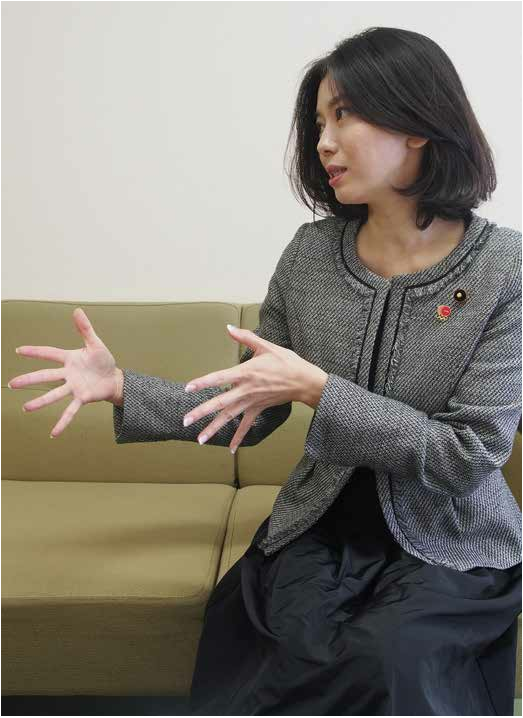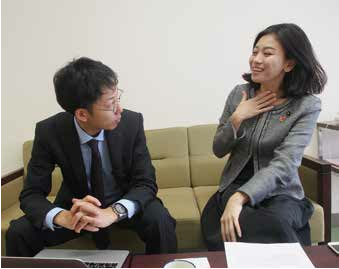Issue:
As Japan prepares for the 2020 Paralympics, a deaf ex-hostess and single mother turned politician is striving for a “barrier free” Tokyo.
In a nondescript narrow meeting room in the Kita Ward city hall, a young assemblywoman sits erect
on one end of the sofa. Her demeanor is friendly, albeit with a hint of insecurity, and it’s hard to fault her for this. Only nine months ago, 31-year-old Rie Saito became the ward’s first deaf assemblywoman, and she’s the first to admit that she has yet to get completely comfortable in her role.
She describes her strength as being “good at listening to people’s hearts.” She has no choice, really, because Saito has been unable to hear ever since she came down with meningitis just before turning 2 years old. The brain infection left her as one of about 340,000 people with a hearing disability in Japan. It didn’t have any effect on her ambition, however, neither deterring her from pursuing a lucrative career as one of Tokyo’s top hostesses, nor from successfully entering politics in April 2015. An interview with Saito today is far from a silent affair. While she prefers to give her answers in writing, she is also adept at voicing her opinions. Becoming familiar with her way of speaking takes some time – her intonation is quite different from that of a hearing person, and she cannot pronounce some letters, like “s.”
“In the beginning we conversed with one another via the computer, even though we sat facing each other,” recalls her secretary, Ryo Masuzawa. He has been working with Saito since her election victory at the end of April 2015, and has become her second voice: for the sake of the interviewer he repeats many of her answers slowly and clearly, sometimes repeats questions very slowly so that she can lip-read and other times types comments into her computer.
When Saito speaks, it is with a visible effort to produce words with clarity, which are accompanied with frequent
gestures. Her movements are not shuwa, Japanese sign language, however, which she only knows on a beginner’s level. There are two ways of thinking on educating the deaf in Japan: One method is to have children attend special schools and learn sign language. The one that her parents followed believes in schooling deaf children like regular children, which is why Saito learned to read lips.
SAITO’S ELECTION SUCCESS WAS revolutionary. But her disability was not the only reason. People who only know her in her present mode of conservative costume, neat bob and modest make-up might not be able to picture her as she was just a few short years ago.

Saito’s life has been anything but straightforward. Frustrated by the discrimination she faced as a deaf child in Aomori, she became a rebellious teenager: She began smoking and drinking at an early age, and was even caught shoplifting. She left high school before graduation. Eventually, her attractive
looks helped her gain work as a hostess, pouring drinks and entertaining male customers. In 2007, Saito moved to Tokyo, where she became a top hostess in Ginza.
The hostess industry is an unforgiving one, and listening skills are considered key. Saito resorted to writing down her thoughts with an elegant fountain pen. Luckily, calligraphy lessons had given her beautiful handwriting, and Saito soon had a lot of regular customers.
While in her mid-twenties, the unmarried Saito gave birth to a daughter, who she is now raising as a single mother. It was another challenge that she faced in Japan, a country in which 98 percent of the children are born within wedlock.
One would think that just one of the factors that labeled Saito as an “outsider” would be enough to stymie a political career in a society that cherishes uniformity. But despite all that, Saito has made it to the mainstream of Japanese society, perhaps precisely because her story strays so far from the typical path. Her autobiography Hitsudan Hostess
(“The hostess with a pen”), published in 2009 by Kobunsha, became a bestseller. That, in turn, inspired a TV drama and a manga based on Saito’s life story.
Then, after eight years of working as a hostess, Saito left her job. While continuing to write, she became active in campaigning for and supporting other disabled people. She began to realize that there was only so much she could do as a regular citizen, and an acquaintance encouraged her to run in the local elections. Saito agreed – and took another step in her unusual life.
Japan’s strict election laws make things even more challenging for the disabled. The ban on the distribution of flyers and documents forces candidates to rely on speeches – a distinct disadvantage for Saito. But she excelled at the frequent meet and greets, and her life story seemed to help: Some voters told her that they had read her book and cheered her on. Others, she believes, could identify with her being a single working mother struggling to raise a child. She was elected with over 6,000 votes, far more than any of her 50 fellow candidates.
Saito’s success, she believes, is part of a sea change. “In Japan,” she says, “diversity is becoming much more accepted.”
Her success is part of a sea change. “In Japan diversity is becoming much more accepted.”

Japanese society has become more open and diverse in the last few decades – something that applies not only to fash-ionistas or foreigners, but also to people with a disability, like Saito.
WHILE THERE IS STILL progress to be made, Japan has come a long way from being a country where disabled people were locked up out of sight from society. Until 1948, children with hearing disabilities were not required to attend school. And it was only in 1973 that deaf people were finally allowed to obtain a regular driver’s license, provided they were using a hearing aid.
The new regulations did not apply, for example, to bus and taxi licenses, thereby limiting the choices of work for the disabled. But even that will soon be rectified. An amendment to be implemented from April will allow deaf people to obtain any type of driver’s license. Masashi Matsumoto, director at the Japanese Federation of the Deaf (JFD), welcomed the planned
revision. “We will tackle an enlightenment campaign to have people understand that there is no problem with hearing-aid users’ driving,” he said in an interview with Kyodo News.
Deaf people faced discrimination in many other aspects of life as well. Until 1979, in fact, they were legally regarded as quasi-incompetent persons, i.e. comparable, for example, to people with a mental disability. As a consequence, their rights were severely limited: they could not get a loan, buy property or succeed the family business. It was only after pressure from the JFD that the Civil Code was changed to give them equal rights.
Now, in the run-up to Tokyo’s hosting of the 2020 Paralympics, Saito has vowed to make not only the city, but also the hearts of its citizens “barrier free.” “This would make life for everybody easier, especially the elderly,” she says.
Disabled people are still quite rare in Japan’s political arena. But about the same time as Rie Saito’s election win, another deaf woman was elected to a local parliament in Hyogo prefecture. Saito interprets this as yet another sign of change.
HER PRESENCE HAS ALREADY resulted in visible changes in the halls of power. Her office was outfitted with a colored lamp indicating the presence of a visitor. The assembly chamber was also technically enhanced. Saito can now give her required speeches using software that audibly reads out her words, a system that she finds very workable.
“Hearing” what other people say, she says, has been more problematic. Voice recognition software displays on a tablet PC the words spoken by other legislators at the microphone. However, the error level of the system, especially during discussion sessions, can at times exceed 50 percent. In those cases, ward office staff sit next to Saito and jot down what the speakers say on a piece of paper.
The technological inroads used to help Saito’s disability have also been revolutionary, as legislatures throughout Japan ban technical devices, including mobile phones. Now, for what is likely the first time in Japan, not only Saito but all legislators are free to use PCs in Kita Ward’s assembly. And deaf citizens who wish to attend public meetings can now borrow the devices. Saito has become a symbol, and her secretary says that whenever it is her turn to address the public at the assembly, around a dozen deaf people show up.
For the time being, Saito seems much more challenged by the demands of her new work environment than by disability-related hurdles of communication. Many of the routines of a legislative year are new to her. She has struggled with some of the professional lingo, but she says she receives a lot of understanding and support from her fellow legislators.
She also draws strength and courage from her voters: “We need people like you (in office), who live with a disability,” is something she often heard during campaigning. The feeling of being obliged to her voters weighs far more heavily than any fears of stumbling. “I want to work hard and deliver results,” she says.
Saito keeps her ears open to the needs of others, and the requests for support are many. Saito’s attentive way of listening and communicating with pen and paper, which she honed during her time as a patient and attentive hostess, now comes in handy in her new career in politics. “By choosing the appropriate Kanji characters for what one wants to say,” she says, “one can sometimes express even more than with words that are spoken.”
Sonja Blaschke is a German freelance journalist writing for publications in Germany, Austria and Switzerland. She also works as a producer for TV filming in Japan.

